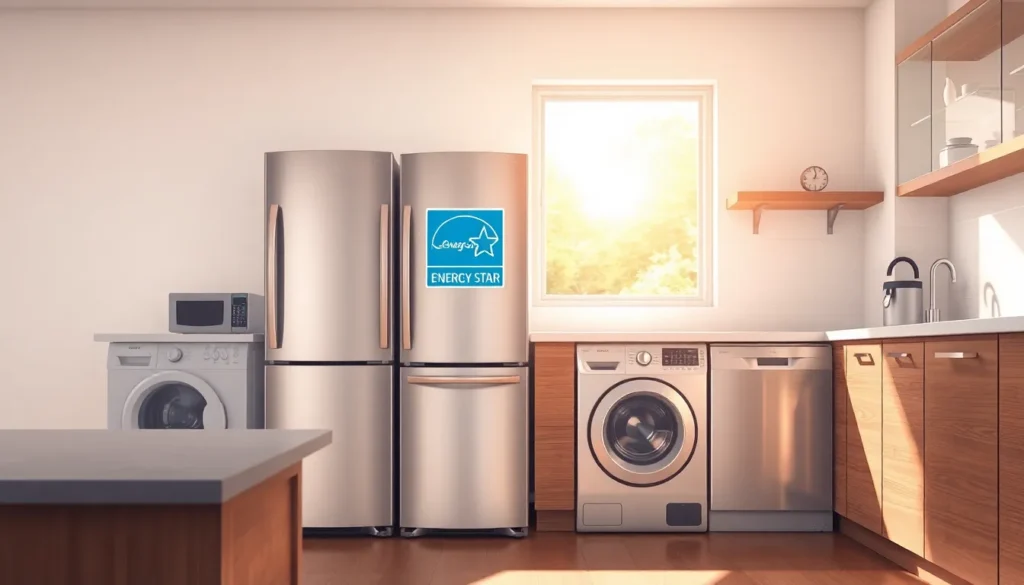In a world where energy bills can feel like a second mortgage, energy-efficient appliances are the superheroes we didn’t know we needed. They swoop in, saving the day by slashing energy consumption and helping wallets breathe a little easier. Imagine a refrigerator that doesn’t just keep your leftovers fresh but also saves the planet one chilly bite at a time.
These appliances are not just about saving energy; they’re about embracing a lifestyle that’s smart, sustainable, and surprisingly stylish. With the right gadgets, homes can become eco-friendly havens without sacrificing comfort or convenience. So, why stick with the old clunkers when you can upgrade to energy-efficient models that’ll make you feel like the James Bond of homeownership? Let’s dive into the world of energy-efficient appliances and discover how they can transform daily life while keeping the environment in mind.
Table of Contents
ToggleUnderstanding Energy-Efficient Appliances
Energy-efficient appliances significantly reduce energy consumption while lowering utility bills. These modern devices contribute to a sustainable lifestyle, proving that comfort and eco-friendliness can coexist.
Definition and Importance
Energy-efficient appliances refer to devices designed to use less energy while maintaining performance. Their importance lies in reducing greenhouse gas emissions and conserving resources, which supports environmental sustainability. By choosing these appliances, consumers lower their energy costs and decrease reliance on fossil fuels. Energy Star ratings help identify the most efficient models, guiding consumers toward smarter choices. Prioritizing energy efficiency is vital not just for personal savings but for promoting a healthier planet.
Common Types of Energy-Efficient Appliances
Common types of energy-efficient appliances include refrigerators, washing machines, dishwashers, and ovens. Refrigerators often feature improved insulation and energy-saving compressors, which lower electricity use. Washing machines, designed with advanced technologies, require less water and energy per load. Dishwashers equipped with efficient motors and soil sensors optimize water usage while maintaining cleaning performance. Ovens come with improved insulation and convection features to cook food more evenly and quickly. Investing in these types of appliances results in significant energy savings and reduced environmental impact.
Benefits of Energy-Efficient Appliances

Energy-efficient appliances offer multiple advantages that significantly impact both finances and the environment. These advancements promote a sustainable lifestyle while enhancing daily comfort.
Cost Savings Over Time
Cost savings accumulate over time with energy-efficient appliances. They use up to 50% less energy compared to standard models, leading to lower utility bills. For instance, annual savings from a refrigerator can reach $200, depending on energy usage and local rates. Investing in these devices results in noticeable savings, and many pay for themselves within a few years. Maintenance also tends to be lower, as these appliances generally experience fewer issues due to their efficient design. Ultimately, switching to energy-efficient options enhances financial well-being in the long run.
Environmental Impact
Environmental impact benefits from the adoption of energy-efficient appliances. These devices reduce greenhouse gas emissions by utilizing less energy, helping to combat climate change. Significant reductions can occur; for example, using Energy Star-rated products can prevent over 240 billion pounds of carbon dioxide emissions annually. Resource conservation also improves with energy-efficient models, leading to less strain on power plants and water supplies. Consumers contribute to a healthier ecosystem by opting for these appliances, as efficient usage lowers overall environmental footprints. Making the switch creates lasting positive effects on the planet.
How to Choose Energy-Efficient Appliances
Choosing energy-efficient appliances involves understanding their features and evaluating options that maximize efficiency. An informed purchase leads to better savings and environmental benefits.
Identifying Energy Star Ratings
Energy Star ratings serve as a reliable benchmark for efficiency. Appliances bearing the Energy Star label meet strict guidelines for energy use established by the U.S. Environmental Protection Agency. These products often consume 10-50% less energy than standard models, significantly contributing to reduced utility bills. Consumers should pay attention to the EnergyGuide label as well, which provides comparative information about energy consumption for similar models. Researching different brands helps identify those with higher ratings, ensuring maximum efficiency. Lastly, choosing appliances with newer technologies can further enhance energy savings.
Considerations When Shopping
Shopping for energy-efficient appliances requires careful evaluation of several factors. First, consider the size and capacity, as larger models often consume more energy. Look for options with advanced features like programmable settings, which optimize performance based on usage patterns. It’s also important to compare annual operating costs alongside purchase prices for a clearer financial picture. In addition, consumers should take note of warranty offerings, as appliances with extended coverage often indicate reliability and durability. Lastly, assessing customer reviews can provide valuable insights into long-term satisfaction and performance.
Top Energy-Efficient Appliances on the Market
Energy-efficient appliances stand out due to their ability to reduce energy consumption and environmental impact. They offer advanced technology, helping consumers save money while enjoying optimal performance.
Refrigerators
Energy-efficient refrigerators use up to 50% less energy than standard models. They often feature advanced insulation and energy-saving modes. For example, selecting a refrigerator with an Energy Star rating can lead to savings of up to $200 annually. These refrigerators are designed to keep food fresh while minimizing electricity costs. Many models also offer smart technology, allowing owners to monitor and control settings remotely.
Washing Machines
Energy-efficient washing machines typically consume 30% less energy compared to traditional machines. They achieve this through advanced water extraction and load-sensing technology. A model with an Energy Star rating may save over 25 gallons of water per week. These machines also provide various settings, catering to different fabrics and soil levels. Consumers appreciate that energy-efficient washers contribute to lower utility bills while maintaining excellent cleaning performance.
Dishwashers
Energy-efficient dishwashers utilize around 30% less energy and water than conventional units. Many of these models include soil sensors to optimize water usage during each cycle. An Energy Star-certified dishwasher can save up to 3,870 gallons of water annually. Features like shorter cycles and energy-saving modes enhance their efficiency. With quieter operations, these dishwashers help maintain a peaceful kitchen environment while delivering optimal cleaning results.
Upgrading to energy-efficient appliances is a smart investment that benefits both the wallet and the environment. These modern devices not only reduce energy consumption but also enhance daily living through advanced features and reliable performance. By choosing Energy Star-rated products, consumers can significantly lower their utility bills while contributing to a healthier planet.
The long-term savings and reduced environmental impact make energy-efficient appliances a wise choice for any household. As technology continues to evolve, these appliances will only become more effective in delivering comfort and sustainability. Making the switch is a step toward a more eco-friendly lifestyle that aligns with both personal and global goals.




